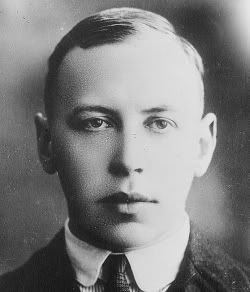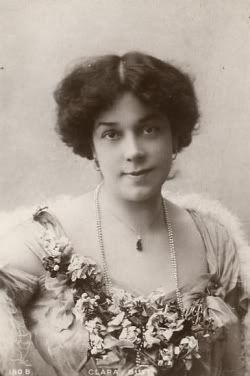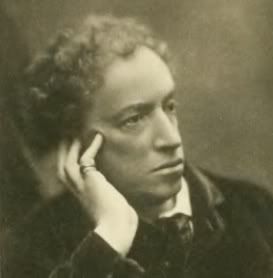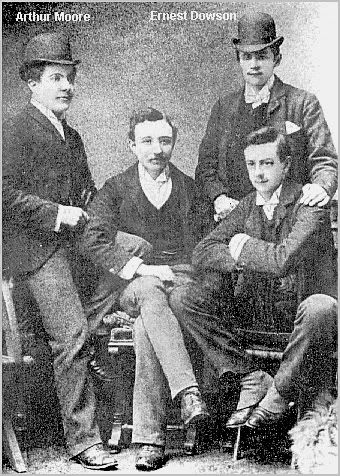
Alfred Noyes is generally acknowledged to have been England's finest poet since Tennyson. The fashionable trivialities of such dwarflike figures as Auden, Betjeman and Larkin bear no comparison do they. Here is one of the best of his shorter poems:
APES AND IVORY.
APES and ivory, skulls and roses, in junks of old Hong-Kong,
Gliding over a sea of dreams to a haunted shore of song,
Masts of gold and sails of satin, shimmering out of the East,
Oh, Love has little need of you now to make his heart a feast.
Or is it an elephant, white as milk and bearing a severed head
That tatters his broad soft wrinkled flank in tawdry patches of red,
With a negro giant to walk beside and a temple dome above,
Where ruby and emerald shatter the sun,—is it these that should please my love?
Or is it a palace of pomegranates, where ivory-limbed young slaves
Lure a luxury out of the noon in the swooning fountain's waves ;
Or couch like cats and sun themselves on the warm white marble brink?
Oh, Love has little to ask of these, this day in May, I think.
Is it Lebanon cedars or purple fruits of the honeyed southern air,
Spikenard, saffron, roses of Sharon, cinnamon, calamus, myrrh,
A bed of spices, a fountain of waters, or the wild white wings of a dove,
Now, when the winter is over and gone, is it these that should please my love ?
The leaves outburst on the hazel-bough and the hawthorn's heaped wi' flower,
And God has bidden the crisp clouds build my love a lordlier tower,
Taller than Lebanon, whiter than snow, in the fresh blue skies above ;
And the wild rose wakes in the winding lanes of the radiant land I love.
Apes and ivory, skulls and roses, in junks of old Hong-Kong,
Gliding over a sea of dreams to a haunted shore of song,
Masts of gold and sails of satin, shimmering out of the East,
Oh, Love has little need of you now to make his heart a feast.
Gliding over a sea of dreams to a haunted shore of song,
Masts of gold and sails of satin, shimmering out of the East,
Oh, Love has little need of you now to make his heart a feast.
Or is it an elephant, white as milk and bearing a severed head
That tatters his broad soft wrinkled flank in tawdry patches of red,
With a negro giant to walk beside and a temple dome above,
Where ruby and emerald shatter the sun,—is it these that should please my love?
Or is it a palace of pomegranates, where ivory-limbed young slaves
Lure a luxury out of the noon in the swooning fountain's waves ;
Or couch like cats and sun themselves on the warm white marble brink?
Oh, Love has little to ask of these, this day in May, I think.
Is it Lebanon cedars or purple fruits of the honeyed southern air,
Spikenard, saffron, roses of Sharon, cinnamon, calamus, myrrh,
A bed of spices, a fountain of waters, or the wild white wings of a dove,
Now, when the winter is over and gone, is it these that should please my love ?
The leaves outburst on the hazel-bough and the hawthorn's heaped wi' flower,
And God has bidden the crisp clouds build my love a lordlier tower,
Taller than Lebanon, whiter than snow, in the fresh blue skies above ;
And the wild rose wakes in the winding lanes of the radiant land I love.
Apes and ivory, skulls and roses, in junks of old Hong-Kong,
Gliding over a sea of dreams to a haunted shore of song,
Masts of gold and sails of satin, shimmering out of the East,
Oh, Love has little need of you now to make his heart a feast.
We cannot imagine that coming from Tennyson can we!
This enraged William Yeats - another pinnacle among twentieth-century poets, although certainly no Englishman. Yeats - believing the diaries to be forgeries - responded by writing this:
"Come Alfred Noyes and all the troop
"A dog must have his day
. . .
"The ghost of Roger Casement
"Is beating on the door."
"A dog must have his day
. . .
"The ghost of Roger Casement
"Is beating on the door."
To this Noyes - he too by this time believing that the diaries could be forgeries - responded in 1937 with a public apology; and jolly old Yeats in turn responded like a gentleman by removing Noyes's name from his song.
And even in 1957 poor old Noyes, still brooding upon the question, and still believing the diaries to be forgeries, published an entire book about it: The Accusing Ghost, or, Justice for Casement.
But all of this is quite wrong and perverse - just one example of the perniciousness of demo-cratic mob-rule. The correct attitude we submit would be to acknowledge the diaries as a genuine expression of Casement's enviably joyful and fundamentally harmless experiences - not "foul" or "degraded" at all! To see that such an attitude was possible in that era we need look no further than the delightful poetic productions of the Reverend E. E. Bradford.
Anyway, the primary intention of this thread is to draw particular attention to poetry that has been set to music. It enhances one's experience of music so much when one knows what it is intended to be about does it not! But so often one does not; and one is not told. Sir Edward Elgar did many of Noyes's things - we think of his famous Pageant of Empire of 1924. The texts he set for this work may easily be found on the Inter-Web.
The English critic Miss Drabble writes that Noyes "held violently anti-Modernist views on literature." How wrong-headed of her that is! In fact Noyes, who had the sense to follow the true path of Art, remains to this day the most advanced of anybody in his field.
Here is another little work, short but like most of his poetry strangely moving:
WINNIE AND DAFF.
WINNIE and Daff were making hay.
Was it far away ? Was it long ago ?
For she sits by the fire, and it's sinking low,
And voices are calling her far away ;
She is old and grey, but the whole world seems
Wavering back through a mist of dreams.
Daff and Winnie were making hay :
Winnie drowsed on a warm soft bed
With her smooth brown arms behind her head :
A lazy young kitten she was that day !
And she made poor Daff do all the work,
And she laughed as he did it and called him a Turk ;
For Winnie and Daff were making hay.
And bold young Daff grew shy as a maid :
He'd a down on his lip like the dawning shade
Of a kiss ; but he'd nothing at all to say ;
And Winnie dreamed and forgot to laugh
As she drowsed in the sun and blinked at Daff.
For Daff and Winnie were making hay.
At last he thought she was fast asleep
And tiptoed quietly near to peep :
Oh, her neck-kerchief beside her lay !
He came behind her and looking down
Caught one glimpse of her breast's ripe brown.
Winnie and Daff were making hay.
Then Winnie woke : for she dreamed that her mouth
Was suddenly touched by a breath from the South :
And over her neck it seemed to stray ;
So she boxed Daff's ears, and he couldn't complain ;
For he took his revenge and kissed her again.
Daff and Winnie were making hay.
"One more, Winnie ! " and "Look, Daff, no !
Somebody's coming ! Do let me go ! "
—Was it long ago ? Was it far away ?—
For the room is lit with a low soft light,
As she sits by the dying fire to-night.—
Winnie and Daff were making hay !
Ah, Daff and Winnie, make haste ; one kiss !
Somebody coming ? Indeed there is !
Daff is dead and Winnie is grey !
But she sits by the fire to-night and it seems
The years roll back for her dim old dreams.
Hush! Daff and Winnie are making hay.
Was it far away ? Was it long ago ?
For she sits by the fire, and it's sinking low,
And voices are calling her far away ;
She is old and grey, but the whole world seems
Wavering back through a mist of dreams.
Daff and Winnie were making hay :
Winnie drowsed on a warm soft bed
With her smooth brown arms behind her head :
A lazy young kitten she was that day !
And she made poor Daff do all the work,
And she laughed as he did it and called him a Turk ;
For Winnie and Daff were making hay.
And bold young Daff grew shy as a maid :
He'd a down on his lip like the dawning shade
Of a kiss ; but he'd nothing at all to say ;
And Winnie dreamed and forgot to laugh
As she drowsed in the sun and blinked at Daff.
For Daff and Winnie were making hay.
At last he thought she was fast asleep
And tiptoed quietly near to peep :
Oh, her neck-kerchief beside her lay !
He came behind her and looking down
Caught one glimpse of her breast's ripe brown.
Winnie and Daff were making hay.
Then Winnie woke : for she dreamed that her mouth
Was suddenly touched by a breath from the South :
And over her neck it seemed to stray ;
So she boxed Daff's ears, and he couldn't complain ;
For he took his revenge and kissed her again.
Daff and Winnie were making hay.
"One more, Winnie ! " and "Look, Daff, no !
Somebody's coming ! Do let me go ! "
—Was it long ago ? Was it far away ?—
For the room is lit with a low soft light,
As she sits by the dying fire to-night.—
Winnie and Daff were making hay !
Ah, Daff and Winnie, make haste ; one kiss !
Somebody coming ? Indeed there is !
Daff is dead and Winnie is grey !
But she sits by the fire to-night and it seems
The years roll back for her dim old dreams.
Hush! Daff and Winnie are making hay.
[Sorry - the individually indented lines generate a blank line before and after - have not yet worked out how to adjust that unwanted formatting.]




 TOSH!
TOSH!

Comment